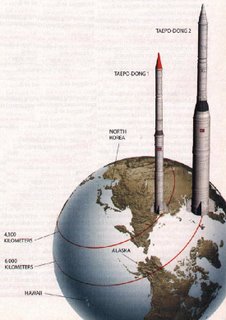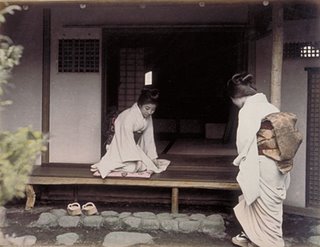
Kim Sung-han is a professor and director general for
American studies, the Institute of Foreign Affairs and
National Security :
" Now that North Korea has turned its back on the
international community's wish and committed a
provocative act, Washington has no option but to
discuss pressure and sanctions against Pyongyang at
bilateral and multilateral levels. The United States
is seeking ways to "punish" North Korea politically
and economically at the bilateral level and in the
United Nations. Japan, which has always reacted more
sensitively to North Korea's missile threat than to
its nuclear program, has also found it difficult to
just sit and watch as North Korea takes steps to
aggravate the situation. Thanks to the "failure" of
North Korea's latest Taepodong-2 missile test, a
missile did not pass through Japan's airspace, unlike
in 1998. Even if the missile test failure was not the
intended outcome on the part of Pyongyang, however,
Japan has to take preventive measures at all levels."
So, it is said :
North Korea is building new bases on its east coast,
possibly to deploy ballistic missiles targeting Japan
and its U.S. military installations, a state-run
South Korean think tank said. The move could involve
plans to deploy the long-range Taepodong-2 missile
that the North test-fired last month, the Institute of
Foreign Affairs and National Security said in a
report. The reclusive state is also believed to have
obtained Chinese technology via Iran while developing
the Taepodong-2, its newest long-range missile and one
believed capable of reaching the U.S., the state-run
institute said in the report.
"New underground missile bases have been built or are
under construction around the border with China and
along the east coast," the report said. Those "on the
east coast could be seen as bases for medium- or
long-range missiles targeting Japan and U.S. military
bases in Japan," it said. Taepodong-2 and SSN-6
missiles, which have a range of up to 4,000 km, could
be deployed to the new bases, the think tank said. The
report, dated July 26, didn't give a source for the
information. Its main author, Yun Deok Min, could not
be reached for comment. Missile exports have been a
major source of hard currency for North Korea. The
report said the North makes $ 150 million a year from
missile exports. Buyers of North Korean missiles
include Iran, Libya, Syria, Egypt and Yemen, according
to the report. "North Korea is at the center of
global ballistic missile proliferation," it said.

Since North Korea launched a shorter-range Taepodong-1
over Japan in 1998, Pyongyang's missile program has
become a major security issue in Northeast Asia,
adding to concerns about the hardline regime's pursuit
of nuclear arms. Tensions flared anew when the
Pyongyang regime test-fired seven missiles toward
Japan on July 5, including a Taepodong-2. The
missiles landed harmlessly in waters between the
Korean Peninsula and Japan, but the Taepodong-2 failed
right after launch. The report said North Korea
closely cooperated with Iran in developing the
Taepodong-2 and there is a high possibility Chinese
designs and technology are being used in its
development because Iran has cooperative relations
with China in the defense industry. The report also
said the North has a Scud missile base just 50 km
north of the border with South Korea that can hit
targets deep in the South.
Francais : Commentaire
"Toute exacerbation de la confrontation politique
débouchant sur un isolement de la Corée du Nord et
l'application de sanctions contre elle contrediraient
nos intérêts à long terme en Asie du Nord-Est. De
toutes les conséquences négatives éventuelles qui en
découleraient les plus graves seraient la disparition
des perspectives d'un règlement du problème nucléaire,
le torpillage du projet de construction de la voie
ferrée Transcoréenne avec notre participation et de
son raccordement sur le Transsibérien pour assurer
l'acheminement de conteneurs entre l'Asie et l'Europe.
Il faudrait aussi abandonner le projet prévoyant des
livraisons d'hydrocarbures en République de Corée.
Depuis le vote au Conseil de sécurité la Russie ne
détient plus de leviers réels permettant de contrôler
la situation autour de la Corée du Nord. Ils sont
désormais entre les mains des Américains. Avec de
tels atouts, Washington va pouvoir chercher à
attribuer à Moscou le rôle d?auxiliaire. Il est
probable que les Etats-Unis vont concocter un
programme à eux de "mise à mort" de la Corée du Nord,
conforme à leur manière d?agir à l'égard des "Bad
Boys".
Il est patent que maintenant Moscou aura énormément de
mal à renouer la discussion avec les Nord-coréens qui
ont douloureusement réagi aux démarches diplomatiques
russes à l'ONU. Cependant, nous devrions dire
clairement à nos partenaires occidentaux que la Russie
ne considère pas l'histoire des missiles comme un
prétexte pour exacerber la situation autour de la
Corée du Nord et prendre de nouvelles décisions
draconiennes, aussi motivées soient-elles. Maintenant
que la résolution 1695 du Conseil de sécurité a été
adoptée, il faut tirer un trait sur la question des
missiles. La Russie ne saurait appuyer des actions
susceptibles d'approfondir l'isolement et de durcir le
châtiment de la Corée du Nord."
Alexandre Vorontsov, de l'Institut d'études
orientales. Académie des sciences de Russie. Cité par
Vremia novostei, 04/08/2006. (Traduction)

" Hotoke no kao mo, san do made! "
No comments:
Post a Comment
Be nice and informative when you post or comment.
Thank you to visit Asian Gazette Blog of Joel Legendre-Koizumi.